We’ve all been guilty of loving something purely for the aesthetic. Or maybe the concept, if not the execution. Or the characters, but not the plot. Or vice versa. Or maybe we love it because it’s so intricate, it’s actually frustrating.
Sometimes, all you need from a story is a kick in the imagination box, and your brain does the rest. Other times, you exit a world flummoxed, but still undeniably pleased with what you’ve experienced. Sometimes coherence is over-rated. Here are some stories that fill us with wonder… even when we’re not entirely sure what’s going on.
Cloud Atlas by David Mitchell
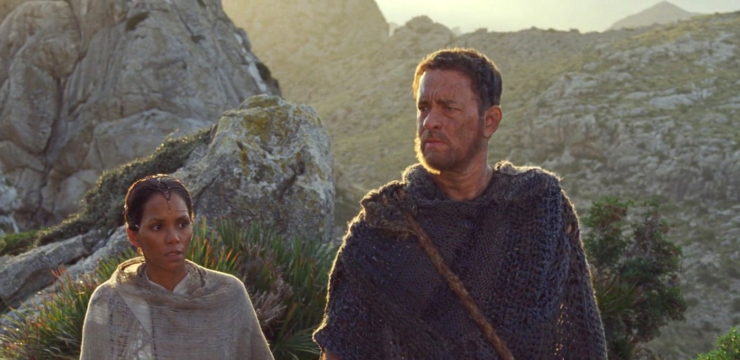
Honestly, this applies to both the book and the 2012 film adaptation. While it is a truly brilliant exercise, Cloud Atlas asks a lot of its audience, forcing them to balance multiple time periods, a structure that runs forward and then backward chronologically, and a reincarnated protagonist. (The only indication of that plot point is a birthmark shared by each reincarnation, oddly enough.) Cloud Atlas is not an indiscernible story, but it is so layered that it may require multiple reads, or viewings, to swallow up every bit and piece that make the narrative so delicious. Each protagonist, each time period, teaches us something about humanity and the flow of time. While each central character in the novel has a very different journey, they are all ultimately bound by a desire to impart truth into the world, by actions, testimony, music, and so on. Each of them experiences how people do wrong to other people, and it is this understanding that binds their experiences into a single tale.
Buy the Book


Cloud Atlas
LOST
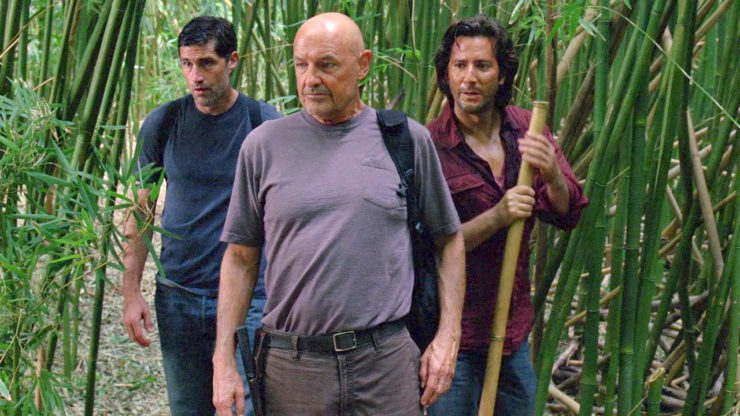
The island is a metaphor, right? Is it? What is it a metaphor for? Wait, the island is purgatory. No, the island is hell? No, it’s none of those things. But the smoke monster is the devil, or pure Evil? Why do time travel and alternate timelines suddenly become a thing? And what the heck is a Dharma Initiative? You can move the island by turning a wheel? Fans spent years dissecting this show as it was airing, but all the theorizing in the world couldn’t really make sense of all the threads. For some, that kinda ruined the experience, but for many, that was part of LOST’s charm—a journey so complex, you could never truly understand the entirety of it. As part of the mega shift in serialized television towards season-long arcs, the early attempts were bound to wobble a bit, and that was part of what made the show exciting.
Annihilation / Southern Reach trilogy by Jeff VanderMeer
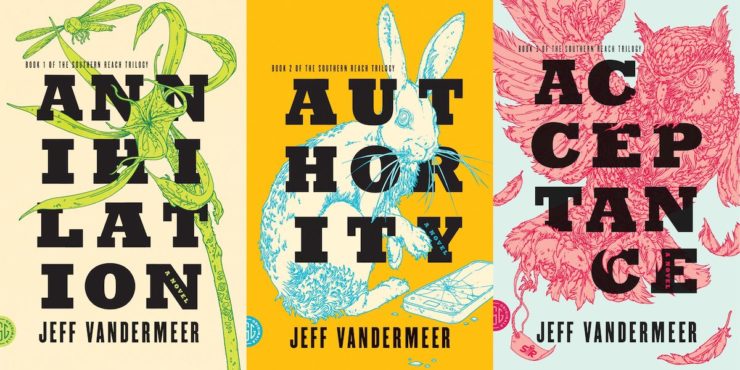
Area X is a terrifying place that can only be survived by people who are… weird enough to handle it. At least, that seems to be what Annihilation (and the rest of the Southern Reach trilogy for that matter) posits. The biologist of the 12th expedition to the region quickly discovers that the psychologist in charge of her group means to control them all with hypnotic suggestion, but she is immune due to inhaling some spores that cause her to glow. Area X seems to absorb people into its makeup; after some time there, the biologist becomes convinced that her husband—who she initially believed had died after making it home from the previous expedition—never made it back, and exists somewhere among the flora and fauna. Will she become a creature, too? And how does that even… work? While there are plenty of science fiction stories that warn us of the terror of space, the strangeness of physics, there are fewer that demonstrate the sheer terror of biology and nature the way that Annihilation do.
Buy the Book


Annihilation
Interstellar
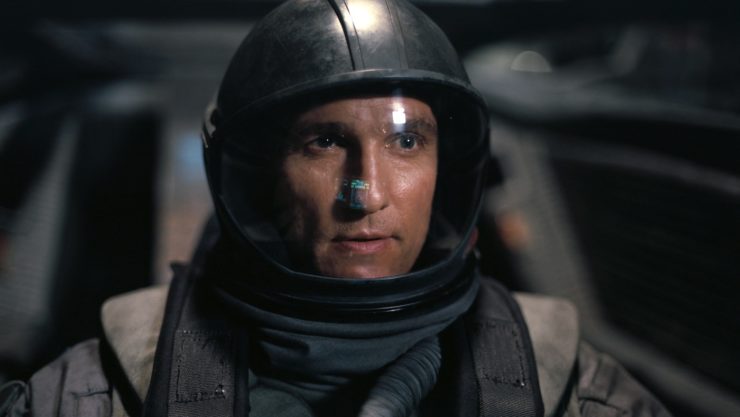
Can you interact with the past via a black hole? Christopher Nolan seems to think so, and who are we to argue? The entirety of Interstellar rests of theories of time dilation close to a black hole, resulting in astronaut Joseph Cooper staying the same age while his daughter and everyone on Earth grow older and older. Eventually, Cooper ejects himself into a black hole to give his cohort the chance to make it to the next world they’re tasked with exploring—the result is his arrival in a tesseract of sorts, though we don’t really know if it’s part of the space or created by future humans? Once inside the tesseract, he ends up traveling in time to a point before he left Earth, and realizes that he’s the person who created anomalies in his daughter’s bedroom using gravity. It’s a paradox that leads him to Professor Brand and the mission in the first place. When he comes out of the tesseract, he finds that his daughter solved the problems with the first plan to evacuate humanity from the Earth, and now everyone is living on a colony above Saturn. The point is, time is meaningless but love endures. At least, that’s probably the point.
Malazan Book of the Fallen by Steven Erikson and Ian C. Esslemont
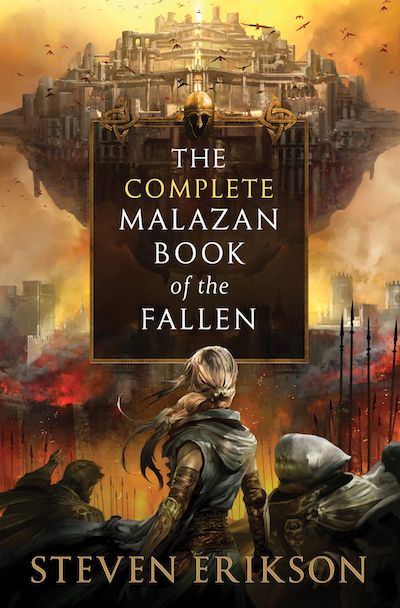
The Malazan series can be difficult to follow because it spans thousands of years, is utterly meticulous in its rendering, and also forgoes linear storytelling. In other words, you have to be committed to the world in order to follow what’s going on, and even then, it might take a fair share of mental gymnastics to get each of the story points to line up. Both archaeologists by training, Erikson and Esslemont have a deep knowledge of how societies are constructed and what they leave behind. The might of empires, the fall of nations, the ways that faith and environment shape peoples over the course of ages, Malazan puts all of this into one cohesive narrative… but, like history itself, it’s unlikely that you’ll always be able to kept straight.
Buy the Book


Gardens of the Moon
The Matrix Trilogy
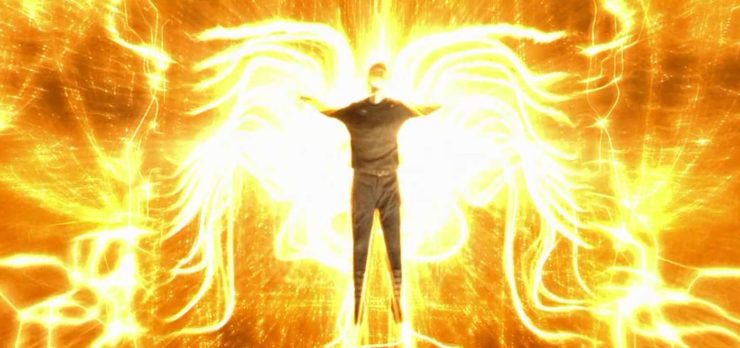
Sure, the first film makes everything seem pretty cut and dried, but if you’ve seen the whole Matrix trilogy, you know that things get a lot weirder. The second movie is taken up by an underground rave/orgy in the city of Zion, and a chase scene while Neo busies himself trying to find the Keymaker to the Matrix. At some point Neo discovers the ability to turn off machines using his mind? By the third film, Agent Smith has become obsessed with destroying both the Matrix and the real world (because he became a rogue program instead of allowing himself to be deleted after his defeat by Neo), and absorbs the Oracle to get precognitive powers. Neo gets blinded in the real world by one of Smith’s agents, but discovers that he can still somehow see the world in golden light. Neo meets the Architect of the Matrix and strikes a deal with him to stop Smith in exchange for peace between machines and humans. There’s a lot of chosen-y religious imagery, but it’s just kinda… there? But that doesn’t stop the films from being weirdly enjoyable.
Dhalgren by Samuel R. Delany
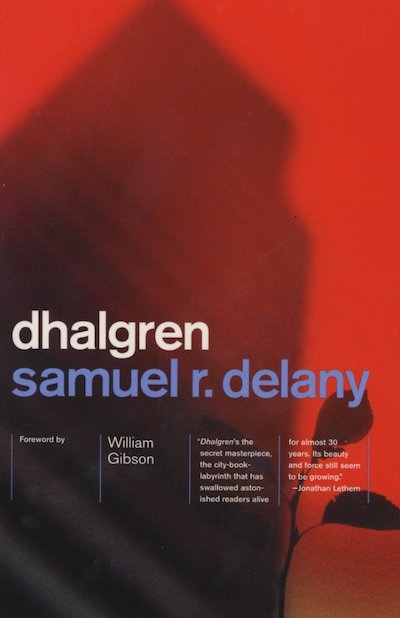
When your protagonist can’t even remember their own name or history, pretty much anything can happen. Set in the city of Bellona, Dhalgren exposes its readers to a phantasmagoria of images and moments that stick in the mind even when their meanings aren’t quite clear. A woman turns into a tree. The sun terrorizes the populace. Two women are found reading the opening of the book itself within Dhalgren’s pages, but the story begins to diverge from what you’ve read. The title itself is a mystery—it may be the last name of a character in the book, but this is never confirmed. Like Finnegan’s Wake, the story ends mid-sentence, but can connect with the book’s opening sentence, making it a never-ending circuit. Repetition and echoes and circular imagery are part of what make Dhalgren such a unique piece of literature, and the book challenges perception as it is being read, blurring the lines of fiction and experience in a way that only Delany can deliver.
Buy the Book


Dhalgren
Battlestar Galactica
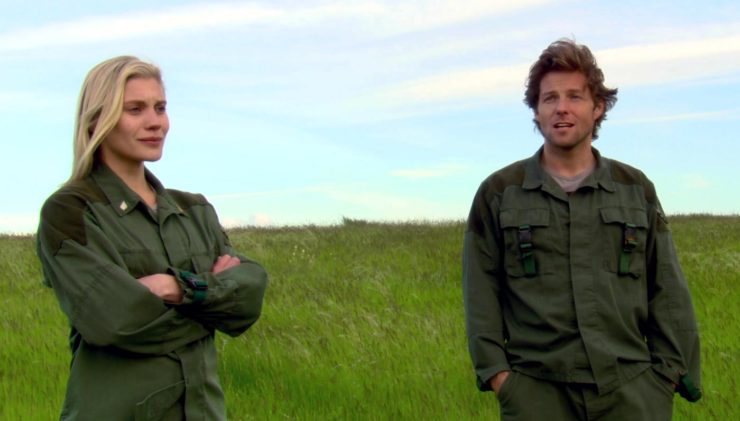
Okay, so Starbuck was… an angel?
Emmet Asher-Perrin loves stories they don’t entirely understand. You can bug them on Twitter, and read more of their work here and elsewhere.










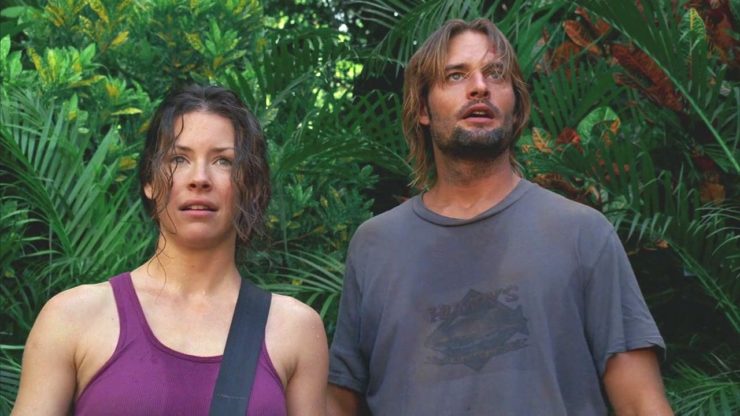
Great list! My favorite book of all time is Little, Big by John Crowley and it would fit right in here. It is huge and dense and I still don’t fully understand it but that’s just part of the magic!
Thank you for this, some favourites of mine here!!! (Lost )
) 
A well thought out list which has some I really liked (Battlestar, Interstellar) and some I felt “meh” (Malazan, Matrix, anything by Jeff Vandermeer). But I might relook them and maybe I will change my mind. Lost is out there on its own, in my view, because the story was driven by the reliance on viewing figures. Hence why it was a mess. Viewable but still, a mess.
See also: everything written by Grant Morrison.
Someone should mention Gene Wolfe, especially the Book of the New Sun. Oh, I just did! ;)
I still have no idea what was going on in Neon Genesis Evangelion. And every time they release new material to ‘explain’ what the f’ was going on, it just gets even more bonkers and confusing. But it is an amazing series!
Definitely, Starbucks post-season 3 is some sort of supernatural apparition (she vanishes into thin air, not to mention that she’s with the Fleet for a whole season while her dead body is somewhere else). So likely an angel.
After all, the Caprica Six that only Baltar can see is an angel. She says it herself: “I am an angel of God sent here to protect you, to guide you, to love you.”
We know she’s not a transmitted image or some program in Baltar’s mind or a hallucination because there’s no implanted chip, and, IIRC, at least once she has a physical interaction with her environment, to help Baltar.
BSG is notorious among SF tv shows because the religious events are not reinterpreted in SFnal terms, they really are supernatural occurrences. It’s not a shaggy God history.
Great article!
A suggestion: the same theme applied to short fiction.
Not in genre but…David Lynch’s Mulholland Drive? I really enjoyed it and Naomi Watts more than earned her Oscar nomination but please explain what, if anything, the two halves of the film have to do with each other.
For certain values of “enjoy”/YMMV, pretty much anything by Barth, Pynchon, Joyce, Fuentes…
Most weird fiction will fit in comfortably with this (pretty fantastic) list. China Mieville. K.J. Bishop’s The Etched City. The Library at Mount Char. The Vorrh. All great stuff.
It’s worth noting that based on the evidence as presented in Battlestar Galactica, God is a dick. An utter raging asshole. Silver Age Superman’s got nothing on him. Look at how Head Six treats Baltar during season 1 and scale that up.
@7: Ah, but what if the “angels” are not truly supernatural/divine, but instead are Sufficiently Advanced Aliens? The angels in the reboot are directly analogous to the “Beings of Light” from the original BSG series, which also presented themselves in religious terms but which clearly utilized technology, including starships.
In the words of a certain Federation captain, “What does God need with a starship?”
I submit the film version of 2001. It’s one of the most beautiful movies I’ve seen, but if you haven’t read the book it’s incomprehensible.
Great list. I would add Duplex by Kathrine Davis and Borne by Jeff Vandermeer.
I’ve a soft spot for the maligned Final Fantasy movie. I dont entirely grasp the plot, but I still like it.
@13: It would be possible, and that would be giving a SFnal interpretation. The thing is, BSG does not do that at any point. In your head canon, of course you can believe that Starbuck’s vanishing, and her being there after death, is an intervention of super-advanced aliens… But certainly, there’s nothing in the series supporting that idea, and there is dialog supporting the supernatural explanation.
Which is wonderful, even if you’re a non-believer (as I am), because it is certainly original for a SF show to do that.
Thinking about it, it seems to me that ‘Lost’ and BSG (two of my favourite series) had diametrically opposed reasons for being obscure. ‘Lost’ posited a rationale explanation for Heaven/Hell, Lucifer, Eden (with the cast actually playing key parts in these myths, thanks to the Island’s peculiar location time) while ‘BattleStar Galactica’ had a religious event take place in the world of hard SF. In both cases, the producers ran the risk of offending their audience, either for positing a rationale explanation for a lot of Christian beliefs or for introducing a religious element into a series in which (theoretically) it had no place.
@18:
That’s a very interesting interpretation of Lost.
What’s interesting is that – or so I reckon – those ideas were in the respective scripts from the get-go, but the transition from script to screen often leads to unpredictable outcomes. Locke was set up as a fallguy from the start, but ended up being one of the most popular characters in the show, so much so that his subsequent incarnation as pure evil was actually anticlimactic – ie, for once the devil didn’t get all the best tunes. By extension, the series had attracted a sizeable audience who were drawn to a character that was the embodiment of blind faith. Having this turn out to be a bad thing was never going to be popular with them, so the ending tried to have its cake and eat it (ie, the characters either go to heaven, or virtual versions get downloaded into virtual reality* by the island’s AI and are deleted once they’ve resolved their issues: take your pick).
BSG stuck to its guns – sort of – but Starbuck’s disappearance, reappearance and disappearance was tonally at odds with the rest of the series, and suggested they were just making stuff up as they went along (which in fairness, i don’t think they were).
* the sideways world.
Twin Peaks, especially season 3! So great, so confusing!
BSG makes total sense, Starbuck is the 1st human/cylon hybrid, her father Daniel is the Cylon “skinjob” that got boxed. Google “Cult of Daniel” to get the details, its the way I’ve totally retconned the end of the series
There are some lovely choices here. “Cloud Atlas” is forefront in my mind these days, especially the final scene which depicts a sort of post pandemic future that is hopeful in its own way.
There’s a legend about the making of 1946 film version of The Big Sleep, in which director Howard Hawks realized halfway through filming that he had no idea of who killed the chauffeur. So Hawks called up his screenwriter, William Faulkner, to find out and after consulting his notes, Faukner had no idea, either. So then he called up Raymond Chandler himself, and Chandler just shrugged. “I just forgot about him,” he said.
That’s pulp fiction plotting for you. As Chandler once wrote: the scene outranks the plot. A good plot consists of good scenes. If you get stuck, have someone walk through the door with a gun.
I remember seeing the Cloud Atlas at the movies and thinking it was gorgeous to look at, but what the heck was going on? I sort of ‘got it’ despite not being able to follow it.
Also beautiful to look at, but jumping through all sorts of timelines was The Fountain, starring Hugh Jackman.(2006)
https://en.wikipedia.org/wiki/The_Fountain
I wondered if Malazan would be on this list. On one hand, readers are expected to be confused and to struggle with understanding it. On the other, readers are expected to be unable to coast through it without making an active effort to understand it. (Every flipping time I see the series described to new or potential readers, e.g. on Facebook, someone says “It doesn’t hold your hand” and/or “It doesn’t spoon-feed you information.”) Personally, I tend to more or less lose track of the plot in any story I read, and consider it a bonus when don’t; I read stories for their settings and characters, not the plots. Thus I didn’t find Malazan especially confusing, though I eventually started reading along with the excellent (and completed) Malazan Reread of the Fallen here on tor.com and found it helped me keep track of who was where and what they were doing. Mostly the series served me as 400+ audiobook-hours of pleasant background noise.
I dislike Cloud Atlas because I dislike most believable Earth-based dystopia stories* and the other stories didn’t do much for me either. But I don’t think I got that hung up on the weirdness of its plot structure once the nested stories began to go in reverse. Admittedly, I apparently missed much of what made it brilliant, as it just seemed like a set of stories with impressively diverse formats, linked with each other in a clever and improbable but not vastly-significant chain.
*The sole exception being Margaret Atwood’s MaddAddam trilogy, which killed my optimism softly with fun science.
@1: I loved ‘Little, Big’ – not just the story, but Crowly’s beautiful narrative. Have you read ‘Engine Summer’?
L’Année dernière à Marienbad (Last Year at Marienbad) might as well be here. Is it genre? Who knows? It’s supposedly loosely inspired by a science fiction novel, though the movie has no genre trappings. Still, if you ever wanted to see Sapphire and Steel as a French art film where Sapphire and Steel never actually show up, but time slips or parallel dimension jumps may be happening, this is the one.
(I decided I needed to see this after hearing the musician John Foxx talk about it as an influence in an interview. He’s also commented on the importance of JG Ballard to a lot of his work, and since I like Ballard and Foxx, I figured I should see this movie. Definitely worthwhile.)
That’s pulp fiction plotting for you. As Chandler once wrote: the scene outranks the plot. A good plot consists of good scenes. If you get stuck, have someone walk through the door with a gun.
Reminds me of the first time I saw Marathon Man. Some scenes in that film are so good (especially those featuring Laurence Olivier who until then I’d written off as a total ham) that it wasn’t until it was nearly over that I realised none of it made any actual sense. The specifics elude me now, as it was a long time ago.
Some screenwriters make a career out of being able to write a scene – ie, they don’t necessarily build their reputations on their grasp of narrative arc etc; just give them two people in a room. Robert Towne is a case in point. That crucial scene in Crimson Tide between Hackman and Denzel Washington? The one that establishes what makes the two so different? That was his work, and was written and shot after filming was completed.
I would add “Tales From The Loop” I loved it for it’s strange retro-neo tech and odd atmosphere. Kubrick like vision and slowness. Derived from artwork of Simon Stålenhag. See the artwork and the series!!!
The Germain sci fi series Dark very much fits here.
I read Dahlgren right after I graduated college and thought it was the weirdest but one of the most difficult stories to follow. I can’t wait to read again.
Ghost stories by Robert Aickman, Henry James and Walter De La Mare are all about this often.
Tanith Lee’s “The Isle Is Full Of Noises” is a bit like that.
Shinya Tsukamoto’s Haze, Snake Of June. Takashi Miike’s Visitor Q.
Any amount of animators I like.
House of Leaves by Mark Danielewski! A story in a story in a story, told through meandering spirals of texts and upside-down footnotes about a vast chasm of a house and…a monster? Maybe? Definitely something bad. All plot points, including the very narrative structure of the book itself, are left unclear.
I did not understand what was going on but I certainly enjoyed the ride (and the way you have to hold the book at every angle imaginable in order to read it through!).
I think Dark Science from Dresden Codak fits here. Absolutely beautiful art, hard if not impossible to follow plot.
Hob is amazing though.
For books, I think of David Lindsay’s A Voyage to Arcturus.
For films, I think of David Lynch’s Eraserhead.
The best all time head spinning series has to be “The Prisoner” https://en.wikipedia.org/wiki/The_Prisoner
“The Prisoner” also had a fantastic opening sequence and musical theme. https://youtu.be/ygLg-7G0Xp0
#34 beat me to House of Leaves! I completely agree that it would work on this list. Really, any of his work could fit in here comfortably, since his stories are 75% narrative jigsaw puzzle and 25% concrete poetry/mixed media project. Always a fun adventure, for sure!
Re #12: See Harlan Ellison, “Deathbird Stories” et al. Not obscure, really: he just doesn’t have much use for Big G. Ans the Snake People rock!
Tiny nit – ‘cut and dry’ reads better as ‘cut and dried’
When I saw “Last Year at Marienbad” as a young woman, it drove me crazy. I asked my film-going friend, “What is it about?” She liked it but I don’t think she could explain why . . .
For what it’s worth, I found the endings of both “Lost” and “Battlestar Galactica” highly disappointing, after enjoying the series very much. The upshot is that I don’t care for mystical/religious/allegorical endings–I prefer things that make rational sense.
The character development on Lost was top notch and the first three seasons were amazing. After that it just became more and more unanswered questions. Frustrating!
Battlestar was a great show but I couldn’t make nay sense of the Starbuck issue
Apologies for being a curmudgeon about this, but if I’m investing time in reading or watching something I think it should make some sense. And when it doesn’t it’s a failure on the part of the writer(s) and a big disappointment to me. I know people will try to rationalize that by saying, “Well, that’s the point. It shows how…” Bunk. They couldn’t figure out how to make sense of it. That’s why, for example, I stopped watching “Lost” somewhere in the middle of episode 2 — no way can this ever make any sense or have any rational explanation, and explaining it all should be at least a major part of it. And don’t get me started on best-selling thrillers. Failures of thinking and plotting.
@1 Emily Honer, @27 Ben Reagan
Both Engine Summer and Little, Big are utterly lovely books and repay any effort and any number of rereads you put into them. In fact I have Engine Summer sitting on my end table right now waiting for me to jump in on a reread.
I think it’s possible to largely understand what’s going on in both but with Little, Big it definitely takes a number of rereads and thinking about it; with Engine Summer, the ending gives you most of what you need to appreciate the story when you read through it a second time.
An online friend and I have just been talking elsewhere about John Crowley’s Aegypt tetralogy: The Solitudes, Love and Sleep, Daemonomania, and Endless Things. Both of us have reread it several times; while most of the facts and events in it are more or less clear, both of us feel clear that the series is specifically saying something about the nature of belief and faith, especially the apparent human need to believe in magic, but both feel we can’t quite grasp exactly what the series is telling us.
Nearly finished re-reading Aegypt* after an hiatus of nearly thirty years, and would say I enjoyed it even more, second time round. I never did read the other three books. What you reckon? You think I should? I actually think the first book stands on its own merits, but how would I know?
In terms of themes, I guess I’d make a distinction between stories that are oblique in terms of their themes and stories that are fascinating but largely incomprehensible, and would put Aegypt into the former category. I’d see clear corollaries between Moffett’s relationship with Rosie and the notion that history is not how we remember it or believe it to be, and that this is because reality itself is mutable (as opposed to our recollection of it).
* I always thought this was a great title, despite Crowley’s objections.
@46:
Oh hell yes, you should read them all. The original book hit me like a cannonball, but each of the other books is entirely worth reading, and were even when it was plainly not complete. Together they add to something greater than the individual stories.
For the full fan experience, I suppose you should wait 13 years between reading the 2nd and 3rd, and another 7 years before reading the 4th book. :-P Longer in my case, because I’d stopped checking for its release so it was a couple more years before I heard it had been published.
As I understand it, Aegypt is still the name, and still a concept at the core of the books, but now it applies to the group as a whole not to the first book.
@47
Thanks for this – it’s exactly what I needed to know! I only discovered the book was part of a quartet very recently, so I never felt I was missing out. It’s interesting how the gap between each book is almost exactly the same (ie, seven years) given how the first book is all about the cyclical nature of change etc.
OK, good discussion, but really? No one else immediately thought of the movie “Brazil” with Jonathan Pryce, Michael Palin, Katherine Helmond (whose “Complications had complications!”) and Robert Deniro?!! 98% on Rotten Tomatoes.
The Malazan Book of the Fallen is remarkable to me because it is over ten thousand pages of prose, legends, and poetry that leaves almost no loose narrative threads behind when it ends, and because it starts in media res in the middle of a chaotic battle where every little gesture and remark has consequences and meanings that reverberate throughout the remainder of the story. Its ending is not cathartic or eucatastrophic in a way that is going to resonate with a lot of leaders, but it is probably the only ending that it could have had and remain true to the larger themes of the work, which I take to be the the tension between the power of chance (the spinning coin, the fates of the members of the Paran family) and the terrible weight of history (the stories of Icarium and Anomandaris / Anomander Rake). Fate is less important than trauma and exigency. It’s too long and unwieldy to be an unambiguous triumph like The Book of the New Sun, but I’d put it up there with the extended New / Long / Short Sun megaseries. Which is a truly remarkable achievement for something that seems to have started as a combination of an overgrown tabletop RPG setting and a pastiche of the The Black Company.
I’ve read Dhalgren (which is consistently misspelled in the post, by the way) about five times now, and I don’t think it’s particularly cryptic, except in the superficial sense that things happen that are inexplicable if read literally. If you read it more as an attempt to communicate a certain kind of emotional reality in a certain kind of circumstance – a young gay black man living in, say, Galveston with his wife and a shrimp boat worker during a time when a large chunk of America seemed to be eating itself alive – it’s not that hard to track what it’s getting at. I think about the family living in the abandoned apartment building all the time. And I think about Bellona all the time when I read about the lives that people are carving out for themselves in Gary, Indiana or Detroit. Or, increasingly, anywhere in America. Dhalgren is the pre-post-apocalyptic novel that feels most in tune with where we are right now.
I think Lost and Battlestar Galactica both succumbed to a pretty common failure mode of long, serialized stories, which is that you can have a very clear conception of where things are going to end and it’s still going to fall flat if you don’t justify the ending with the story that happens in between. I think the Southern Reach trilogy delivered on what I originally thought Lost was going for, which was basically a bunch of Americans trying to find their way out of a Tarkovsky movie, instead of a prime time soap opera about characters’ various unresolved issues. My problem with the ending was less its hokeyness than that it felt profoundly glib, in a “the real treasure was the friends we made along the way” kind of way. Somehow Jacob’s Ladder managed to make that all work, probably because it didn’t try to rationalize the profoundly irrational.
@50: Spelling mistake fixed, thanks!
I found myself profoundly angry at Lost because it turned the exasperating fan dance of The X-Files up to eleven. I wanted to watch the story in the first episode–the one about fallible, unprepared people torn from their lives and attempting to cope with being cast away on an island full of terrifying secrets. What I got was “Here’s 10 minutes of plot related to last week’s surreal moment and emotionally exploitive flashback. OK, now we’re going to forget both of them and throw a completely different surreal moment and emotionally exploitive flashback at you. Oh, and somebody’s going to do something stupid.” When that one guy was trying to get people together to build an actual, real-world-precedent set of signals for help and everybody just….wandered off…I gave up entirely. I noped out of Once Upon a Time as soon as I realized who was responsible for it; what I have heard about the rest of the series makes me glad I did.
As for Battlestar Galactica, I knew there were going to be problems when the top priority of their new president, while everybody was still effectively in a flotilla of lifeboats and there was no evidence that they had inventoried anything…was having more babies. But I hung in there, looking for moments of actual competence, compassion, and cause and effect, until the sexy torture scene. Finding out later that the big reveal at the end had been “Adam and Eve were astronauts” was just one more eyeroll.
2001 was sufficiently comprehensible the day it came out (I saw the premiere in NY), at least if you had read some related word by Clarke. Parsing the details of the ending was another story, but the gist was clear enough. And the tropes were already tropes.
I don’t care so much for the stories that the authors haven’t bothered to think through or plan out, like Lost. Battlestar Galactica was an impressive achievement in taking a really awful series and rethinking it into a reasonably interesting form. The wrap-up was stunningly weak, but since the series wasn’t really supposed to be heading anywhere in particular, it didn’t seem to matter that much.
The Southern Reach trilogy is a wonderful example of a story where understanding is neither necessary nor possible. And a joy to read.
I’d take note of Alan Moore’s Jerusalem as evoking a similar sense of wonder, though with a comparatively transparent story line.
One might also take Last Year at Marienbad as typical of the category.
Well, the stories here I know and enjoy –the Matrix trilogy, Cloud Atlas (the movie; haven’t read the novel yet), and Dhalgren never really make sense SENSE, if you know what I mean. Neither does Annihilation (the movie; haven’t read the books, either).
But they’re great, engrossing yarns that grab you by the tender parts and don’t let go.
Interstellar, meh. The three or four Nolan movies I have seen are like ingenious crossword puzzles without much meat. And I simply refuse to watch his Batman movies, because of those Marvel-meet-Bergman aspirations of his. Superhero movies and Bergman movies are two very valid, very satisfying, very different types of movie. Mixing them is like mixing steak and chocolate ice cream.
@37, The Prisoner is definitely a what the heck am I watching sort of show but for sheer incomprehensible goodness I give you Sapphire and Steel. My father once watched an episode with me, at the end he turned to me and said, ‘this makes no sense.’ ‘yeah,’ I answered, ‘isn’t it great?’